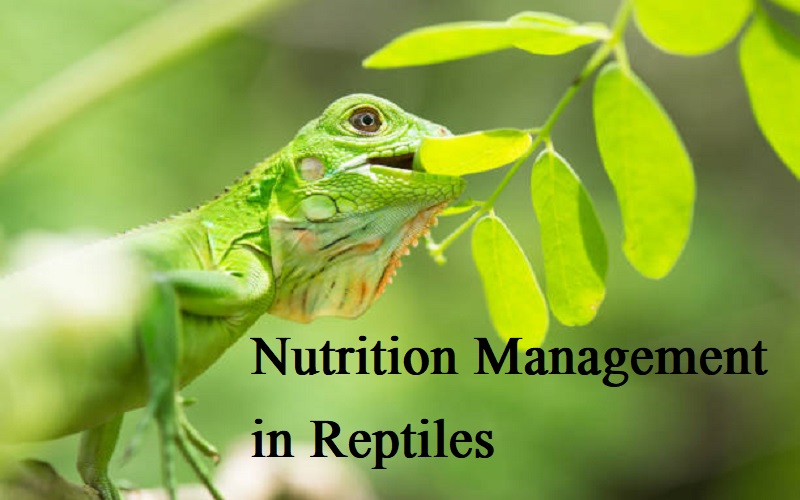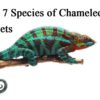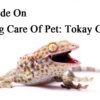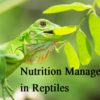If you own a pet reptile and you want to know more about the nutrition management in reptiles then you are in the right space.
In this article let us explain to you about nutrition management in reptiles.
Proper nutrition has to be provided in order to keep the reptile healthy and happy living. Different species follow different nutrition systems and it is always important for the pet owners to know which one suits well for their pets.
Nutrition in Reptiles:
Different types of reptiles follow different food patterns and it is essential to fulfill their needs. Also few species should be made to understand their food patterns. Whenever multiple reptiles are placed in an area, owners should make sure that all the reptiles are provided with their resources and there is no competition among themselves.
In the column below, the concentration of nutrients for each type of the reptile is mentioned.
| Nutrient | Concentration required in Herbivorous Reptiles | Concentration required in Carnivorous Reptiles | Concentration required in Omnivorous Reptiles |
| Vitamin A | 5,000–10,000 IU/kg | 15,000 IU/kg | |
| Vitamin B12 | 0.020 ppm | 0.025 ppm | |
| Arginine | 1.0% | 1.8% | |
| Biotin | 70–100 ppb | 400 ppb | |
| Calcium | 1.4%–2.0% | 0.8%–1.1% | 1.0%–1.5% |
| Cholecalciferol (vitamin D3) | 500–1,000 IU/kg | 500–1,000 IU/kg | |
| Copper | 5–8 ppm | 15 ppm | |
| Crude protein | 19%–22% | 35%–50% | 20%–25% |
| Folacin | 200–800 ppb | 6,000 ppb | |
| Fat | 3%–6% | ||
| Iron | 60–80 ppm | 200 ppm | |
| Iodine | 0.3–0.6 ppm | 0.3–0.4 ppm | |
| Magnesium | 0.04% | 0.04% | |
| Potassium | 0.4%–0.6% | 0.4%–0.6% | |
| Phosphorus | 0.8%–1.0% | 0.5%–0.9% | 0.6%–0.9% |
| Riboflavin | 2–4 ppm | 8 ppm | |
| Zinc | 50 ppm | 130 ppm |
Mentioned some of the types of plant foods that can be provided to the reptiles and their composition in percentage in the column below.
| Food Item | Calcium (%) | Phosphorous (%) | Protein (%) | Fat (%) | Energy (kcal/g) | Dry Matter (%) |
| Broccoli | 0.1 | 0.06 | 3.6 | 0.3 | ||
| Cranberries | 0.01 | 0.01 | ||||
| Carrots | 0.04 | 0.02 | 0.7 | 0.23 | 10.1 | |
| Fig | 0.28 | 0.09 | ||||
| Lettuce | 0.02 | 0.02 | 1 | 0.4 | 0.12 | 4.1 |
| Orange | 0.04 | 0.02 | 0.8 | 0.35 | 13.9 | |
| Radish | 0.04 | 0.02 | ||||
| Tomato | 0.01 | 0.02 | 0.9 | 0.14 | 6.6 | |
| Raspberry | 0.04 | 0.02 | ||||

In the column below some of the animal food types and their composition in percentage is mentioned.
| Food Item | Calcium (%) | Phosphorous (%) | Protein (%) | Fat (%) | Energy (kcal/g) | Dry Matter (%) |
| Earthworms | 0.59 | 0.85 | 49.9 | 5.8 | 22 | |
| Locusts | 0.1 | 0.75 | 61.7 | 19.4 | 31.2 | |
| Egg, whole | 0.05 | 0.22 | 12.3 | 10.9 | 1.47 | 25.2 |
| Adult mice | 0.84 | 0.61 | 19.86 | 8.81 | 2.07 | |
| Mealworms | 0.06 | 0.53 | 52.8 | 35 | 6.53 | 42.2 |

Conclusion:
We hope this was useful for you.
Do check out our recent blog Diseases and Disorders of Reptiles.






